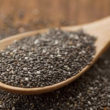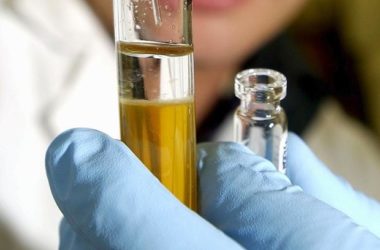Chia seeds have been a staple in Mayan and Aztec diets since 3500 BC. The tiny seeds were valued for their nutritional profile and were used as food, mix with water and consumed as a beverage, ground into flour, pressed for oil and added to medicines. Today, chia seeds are drawing the interest of people for the same nutritional value prized by these ancient civilizations and more.
1. omega-3 fatty acids
Chia seeds are one of the greatest sources of omega-3 fatty acids. Its lipid profile consists of 60% omega-3 fatty acids. It is rich in alpha-linolenic acid or ALA which is particularly beneficial to the heart as it helps lower blood cholesterol levels and helps in maintaining blood vessel function. ALA can also be [partially converted to decosahexaenoic acid (DHA) and eicosapentaenoic acid (EHA), which research has shown to be beneficial for cardiovascular health, mood disorders and proper brain function.
The American Heart Association recommends a daily consumption of omega-3 ALA for the proper maintenance and promotion of cardio vascular health. Just one tablespoon of chia seeds will give you 100% of your daily omega-3 ALA requirement.
2. Protein
Protein is essential for the structure of red blood cells, for the proper functioning of antibodies, for hormone and enzyme synthesis, for growth and for the building and repairing tissues.
Amino acids are the building blocks of protein. Each type of protein is made up of a chain of amino acids linked together. While some amino acids can be synthesized in the body, there are nine essential amino acids that cannot be made by the body and must be absorbed in our diet.
The proteins found in chia seeds are made up of 9 essential amino acids, making it a complete protein food. This is remarkable for a plant based-protein and makes it particularly beneficial for vegetarians.
3. Antioxidants
These tiny seeds are chock full of antioxidants that help the body fight off the adverse effects of free radicals and oxidative stress. Oxidation is a natural process that occurs as the body processes oxygen and the cells make energy from it. This process also produces free radicals, which react with the molecules in cells and causes damage. Free radicals are necessary to a certain degree as they stimulate repair. They become an issue when too much are produced and they overwhelm the repair process. This is what’s called oxidative stress.
Antioxidants neutralize free radicals, helping to slow down the ageing process of the body and the brain, and help prevent chronic illnesses like heart disease, Alzheimer’s, diabetes and cancer.
4, vitamins, minerals and trace elements
Chia seeds are also a good source of calcium, phosphorus, iron, potassium and magnesium. Calcium is essential for the formation of bones and teeth as well as for neuromuscular and cardiac function. Phosphorus supplies phosphate to the bones and maintains kidney health and fluid regulation. Iron is an important component of hemoglobin, which transports oxygen to tissues and organs. Potassium is vital in blood pressure regulation and the maintenance of proper fluid balance in cells. Magnesium helps the body in the absorption of calcium and helps maintain a healthy heart by stabilizing its rhythm and preventing abnormal blood clotting.
4. Fiber
Chia seeds are an excellent source of both soluble and insoluble fiber. Soluble fiber makes up 20% of chia’s fiber content. This type of fiber dissolves in water, forming a gel-like substance that helps in blood sugar control and in lowering LDL (bad) cholesterol levels.
Insoluble fiber forms the remaining 80% of chia’s fiber content. It does not dissolve in water and remains virtually the same in the digestive tract. This provides you with roughage to keep you regular and helps lower your risk of colon cancer.
5. Increased energy levels
Another benefit of chia seed’s high fiber content is its ability to slow down the conversion of carbohydrates into sugars. The gel-like substance that forms after fiber comes in contact with liquids allows for the slow and steady release of energy, keeping the body fueled for longer periods of time. The slow conversion of carbohydrates into sugars also helps in blood sugar control.
6. Better weight control
Chia seeds bulk up when it comes in contact with liquids. This gel-like substance bulks up food, helping you to feel full for longer. Adding chia seeds to your meals regularly can prevent you from overeating and help control your calorie intake.
7. Beautiful skin, hair and nails
Chia seeds contain a nutrient profile that brings countless benefits to your skin, hair and nails. Omega-3 fatty acids can help keep the skin moisturized, while its antioxidants help fight off premature ageing and UV damage. The protein found in chia seeds offers plenty of source material for skin repair, while Vitamin D promotes overall skin health. Copper and iron helps prevent hair loss, while calcium and magnesium stimulates healthy hair growth.












